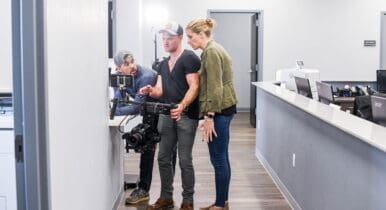5 Things to Look for When Hiring a Down-Ballot Comms Team

Your organization has an axe to grind. A wrong to right. A policy to change. A candidate has a race to win. You have decided to mount a full campaign to get this done, whether at the state house, the campaign trail, or in hearts and minds.
First, deciding what you want to get done is a huge step in and of itself. Kudos. Now, the real fun begins. Next, you may be assessing your capacity: Who is on your team or in your coalition, what knowledge and resources do they bring, and what gaps exist? And the next question is always: How can we fill those gaps, and who should we hire to do the work well?
Staring down the pipe at a daunting, seemingly insurmountable campaign fight feels a whole lot better when you have clearly defined outcomes to achieve and a team of innovative, smart leaders diving into it with you.
But what should you be looking for in the team you hire? As someone who has been both the client and the consultant on many occasions, here is my shortlist of five things to consider when hiring a consultant for your political or public affairs campaign.
1. They should have experience with diverse issues.
Having experience working on a diverse issue set is key — especially after the 2022 midterm cycle when issues like abortion access rose suddenly to the top of voters’ minds after the Supreme Court’s Dobbs decision.
Now, from racial justice to LGBTQ+ rights to disability rights, these issues are central to most advocacy campaigns and require a nuanced and sensitive approach. Look for a firm that has a track record of success in a variety of topic areas and can demonstrate their commitment to promoting equity and inclusion for all members of your community.
You don’t want to have to educate your comms team on the public policy issues that are driving the agenda and important to your constituency. Issues such as environmental sustainability, climate change, infrastructure, mobility and transportation, labor, and education are at the forefront of voter minds and hearts.
2. They have strong relationships with diverse media outlets.
Another important consideration is the firm’s relationships with diverse media outlets — especially in this era of media fragmentation. A strong media strategy can be the difference between a successful campaign and one that falls flat, and having the right connections — especially with publications that serve diverse communities — can help you get your message out to a wider audience.
3. They’re embracing change.
In July alone we’ve seen the launch of a new social media platform (Threads), the rebranding on another one (Twitter into X) and the bankruptcy of a 168-year-old newspaper (Santa Barbara News-Press). That’s why it’s important to work with a firm that can think creatively and come up with innovative strategies to get your message out. Whether it’s through social media, influencer partnerships, or viral marketing tactics, the firm you choose should be willing to think outside the box and try new approaches that will resonate with diverse audiences.
4. They encourage you to speak bravely and boldly.
Many people, particularly women and people of color, avoid public speaking for fear of sounding inexperienced or not authoritative enough. But imagine what your career would look like if you were a more confident speaker, even in everyday occurrences. Your communications team should make you feel empowered to grab the mic.
If you don’t have much speaking experience yet, try to work with a team that offers public speaking coaching. Also, make sure to ask if they’re willing to role-play before interviews so you can anticipate potential questions. It sounds simple enough, but not every firm has the capacity to provide that service.
5. They bring strong skills in research, reporting and data analysis.
Effective political communications requires a deep understanding of your target audience and the issues that matter most to them. You want your messaging to be rooted in strong research and data. More often than not, it helps to have research done in-house by a comms shop because they know the messaging and issues that a client will want to focus on.
Many of the best firms offer services ranging from polling to focus groups, and other forms of research that can help you identify key messaging themes and understand the attitudes and behaviors of your target audience. It can be instructive to ask your prospective communication consultants what research they do in-house.
Kathleen Stuart is the founder of Stuart Collective, which provides public affairs consulting, political strategy, communications and campaign services to leading nonprofits, state agencies, labor unions, and political action committees across the West.


